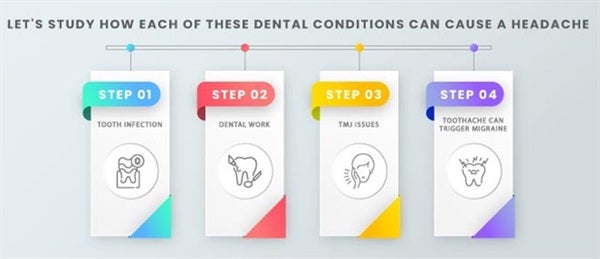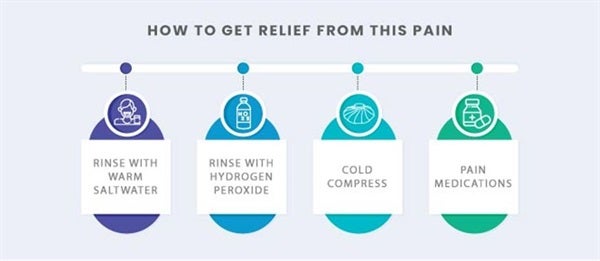Ever experienced that feeling when your toothache just won't go away? You're in a lot of pain, and nothing seems to help. It's frustrating, isn't it! Majority of the people, including yourself, are familiar with the all so annoying toothaches!
Often, you may be suffering from a toothache as well as a headache, and it is very obvious to wonder if the two symptoms are interconnected. That throbbing & extremely uncomfortable soreness and discomfort keeps you awake at night or creates a continuous sense of distress throughout the day are the one thing people always remember. Let's read this guide to know toothache is related to headaches. Yes, a toothache can trigger a headache!
Some of the common causes of Toothaches:
Before we move on to figure out how a toothache & headache are related, it is essential to be acquainted with the causes of toothaches. Toothaches may occur due to multiple reasons such as-
- Cracked or fractured teeth
- Cavities in teeth due to decay
- Exposure of the pulp due to decay or injury
- Tooth abscess
- Exposed roots
- Severe sensitivity in teeth
- High or inappropriately done tooth fillings
- Clenching or grinding of teeth with at night or throughout the day
Why Toothache do causes headaches?
Toothache is an excruciating condition that can cause many different symptoms. One such as headache, which happens when there's discomfort due to tooth pain - in this case, it is trigger due to proximity of the trigeminal nerve, which is the crucial cause of all types of tooth, gum, TMJ, & jaw bone-related pains.
The trigeminal nerve is the primary sensory nerve in the head & originates from within the skull & provides nerves supply to the face, gums, jaw, or the TMJ. Thus, any pain that ascends from these regions can instantly trigger a headache.
Besides these anatomical relations, other ailments such as grinding or clenching of teeth can lead to muscle tension resulting in a headache.
A toothache that initiates from a nerve infection, as in the instance of tooth decay, is usually an intense pain. A toothache triggering due to TMJ issues, gum problems, muscles & sinuses is more dull & troublesome.
Let's study how each of these dental conditions can cause a headache.

Tooth infection:
Frequently, severe tooth decay can cause nerve exposure or abscess formation leads to constant pain in the head. As clarified earlier, it occurs due to the intervention of the trigeminal nerve.
Dental Work:
Surprisingly, improper dental work can trigger a toothache & a headache. A tooth filling, a crown, veneer, teeth alignment using braces, or any other restoration if done inappropriately can trigger a chronic, nagging headache.
Usually, patients fail to bring these conditions to the notice of their oral surgeon’s& prefer to wait to settle down by itself. Hence, these patients suffer from both a toothache and a headache. Inappropriately made dental restoration can also lead to chronic headaches.
TMJ issues:
Talking of the jaw joint, you’ll be amazed to know that being small in size it can impact your wellbeing. As it is the only movable joint in the neck & head region, it is reliable for each & every movement we make using our jaws like eating, talking, chewing, yawning, etc.
The jaw joint also known as Temporomandibular Joint or TMJ are one of the primary cause of chronic headache in individuals. The connection between TMJ issues & headaches is the trigeminal nerve & its innervation to the muscles & joints. Patients with untreated TMJ conditions develop a cluster headache & migraines.
Toothache can trigger migraine:
Another condition that is associated with tooth pain & headache is migraine. While TMJ problems can lead to migraines, chronic, nagging tooth pains, which are not intended to but end up triggering a migraine.
How to get relief from this pain?

In order to get relief from the headache, your oral surgeon initially examines and cures the cause of tooth pain due to which headache triggers. Suppose your headache or toothache is due to tooth decay leading to nerve inflammation. In that case, your oral surgeon may perform a root canal treatment & remove the inflamed and infected nerve tissue.
If your toothache or headache is due to inappropriate filling or other restoration, your oral surgeon will re-do it reinstate your bite.
If your headache is been linked to TMJ issues, your orofacial pain specialist or dentist will examine the root cause & correct it to get relief from jaw pain & thereby, getting relief from headache.
How to treat a toothache at home?
For getting temporary relief from a toothache, you can practice the following-
Rinse with warm saltwater
Saltwater can be a great way to remove bacteria and reduce inflammation. To do this, pour one cup of warm (not hot) water with half teaspoon of salt into glassand rinse your mouth thoroughly.
Rinse with hydrogen peroxide
Hydrogen Peroxide help to reduce inflammation and pain, but be careful not to swallow the solution. Dilute with equal parts of water- don't drink straight from your bottle!
Cold compress
If you have pain or swelling, you can apply a cold compress or ice wrapped in a piece of cloth to the affected area for about 20 minutes. You can repeat it after every few hours.
Pain medications
If you are suffering from a severe toothache, it is always recommended to consult your oral surgeon to get your treatment done correctly. You may also take some of the pain relievers for toothache to ease your ongoing pain. There are many over-the-counter pain medications available that can help alleviate the pain and inflammation.
Takeaway
At last, getting to the extremity of your toothache or headache can be a deadly, challenging process. But rest assured: Once diagnosed, you can move ahead with an appropriate treatment plan. The treatment may be as simple as getting a cavity filled, or you can also take an antibiotic for a sinus infection. There are many ways to stop or reduce the severity of your tooth grinding. You can wear a nightguard, avoid certain foods that may trigger this habit (caffeine, for instance), and practice relaxation exercises before bedtime.